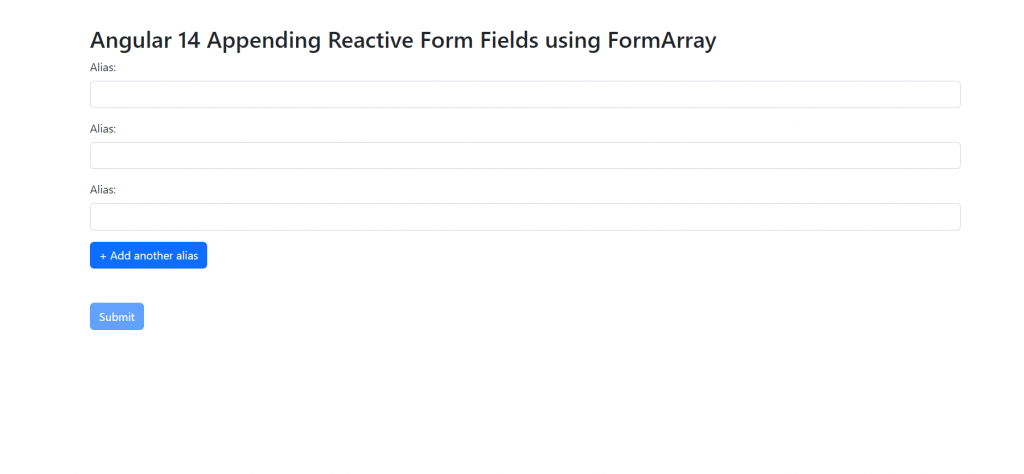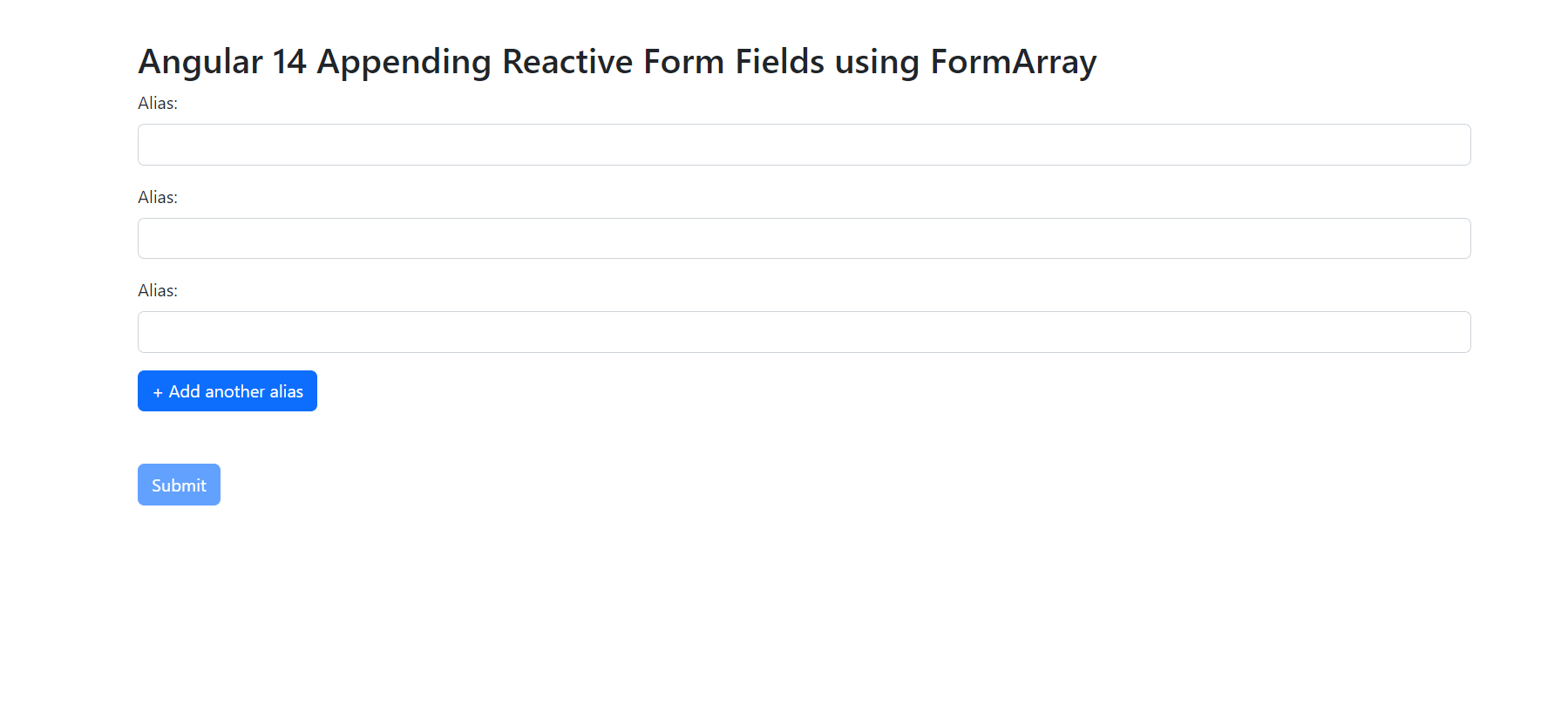Hello to all, welcome to therichpost.com. In this post, I will tell you, Angular 14 Appending Reactive Form Fields using FormArray.
Guys with this we will cover below things:
- Angular 14 Reactive Form Implelemtnation.
- Reactive forms with append field.

Angular14 came and Angular 15 will come soon and if you are new then you must check below link:
Here is the code snippet and please use carefully:
1. Very first guys, here are common basics steps to add angular 14 application on your machine and also we must have latest nodejs version installed for angular 14:
npm install -g @angular/cli ng new angularform // Set Angular 14 Application on your pc cd angularform // Go inside project folder
2. Now run below commands to set bootstrap 5 modules into our angular 14 application for responsiveness (optional):
npm install bootstrap npm i @popperjs/core
3. Now friends we just need to add below code into angularform/angular.json file (optional):
"styles": [
...
"node_modules/bootstrap/dist/css/bootstrap.min.css"
]
4. Now guys we will add below code into our angularform/src/app/app.module.ts file:
...
import { ReactiveFormsModule } from '@angular/forms';
@NgModule({
...
imports: [
...
ReactiveFormsModule,
],
providers: [],
bootstrap: [AppComponent]
})
export class AppModule { }
5. Now guys we will add below code into our angularform/src/app/app.component.ts file:
import { Component } from '@angular/core';
import { FormGroup, FormControl, Validators, FormBuilder, FormArray } from '@angular/forms';
@Component({
selector: 'app-root',
templateUrl: './app.component.html',
styleUrls: ['./app.component.scss']
})
export class AppComponent {
title = 'angularcrud';
constructor(private fb: FormBuilder) { }
profileForm: FormGroup = new FormGroup({
firstName: new FormControl(''),
lastName: new FormControl(''),
});
submitted = false;
ngOnInit(): void {
this.profileForm = this.fb.group(
{
firstName: ['', Validators.required],
lastName: ['', Validators.required],
aliases: this.fb.array([
this.fb.control('')
])
});
}
get f() { return this.profileForm.controls; }
onSubmit() {
// TODO: Use EventEmitter with form value
this.submitted = true;
if (this.profileForm.invalid) {
return;
}
console.warn(this.profileForm.value);
}
get aliases() {
return this.profileForm.get('aliases') as FormArray;
}
addAlias() {
this.aliases.push(this.fb.control(''));
}
}
6. Finally we will add below code into our angularform/src/app/app.component.html file:
<div class="container p-5">
<form class="" [formGroup]="profileForm" (ngSubmit)="onSubmit()">
<div class="mb-3">
<label class="form-label" for="first-name">First Name: </label>
<input class="form-control" id="first-name" type="text" formControlName="firstName" [ngClass]="{ 'is-invalid': submitted && f['firstName'].errors }">
<div *ngIf="submitted && f['firstName'].errors" class="invalid-feedback">
<div *ngIf="f['firstName'].errors['required']">FirstName is required</div>
</div>
</div>
<div class="mb-3">
<label class="form-label" for="last-name">Last Name: </label>
<input class="form-control" id="last-name" type="text" formControlName="lastName" [ngClass]="{ 'is-invalid': submitted && f['lastName'].errors }">
<div *ngIf="submitted && f['lastName'].errors" class="invalid-feedback">
<div *ngIf="f['lastName'].errors['required']">LastName is required</div>
</div>
</div>
<div formArrayName="aliases">
<h2>Aliases</h2>
<div *ngFor="let alias of aliases.controls; let i=index">
<!-- The repeated alias template -->
<div class="mb-3">
<label class="form-label" for="alias-{{ i }}">Alias:</label>
<input class="form-control" id="alias-{{ i }}" type="text" [formControlName]="i">
</div>
</div>
<button class="btn btn-primary mb-5" type="button" (click)="addAlias()">+ Add another alias</button>
</div>
<button class="btn btn-primary" type="submit" [disabled]="!profileForm.valid">Submit</button>
</form>
</div>
Now we are done friends and please run ng serve command to check the output in browser(locahost:4200) and if you have any kind of query then please do comment below.
Note: Friends, I just tell the basic setup and things, you can change the code according to your requirements. For better understanding please watch video above.
Guys I will appreciate that if you will tell your views for this post. Nothing matters if your views will be good or bad.
Jassa
Thanks

Leave a Reply
You must be logged in to post a comment.